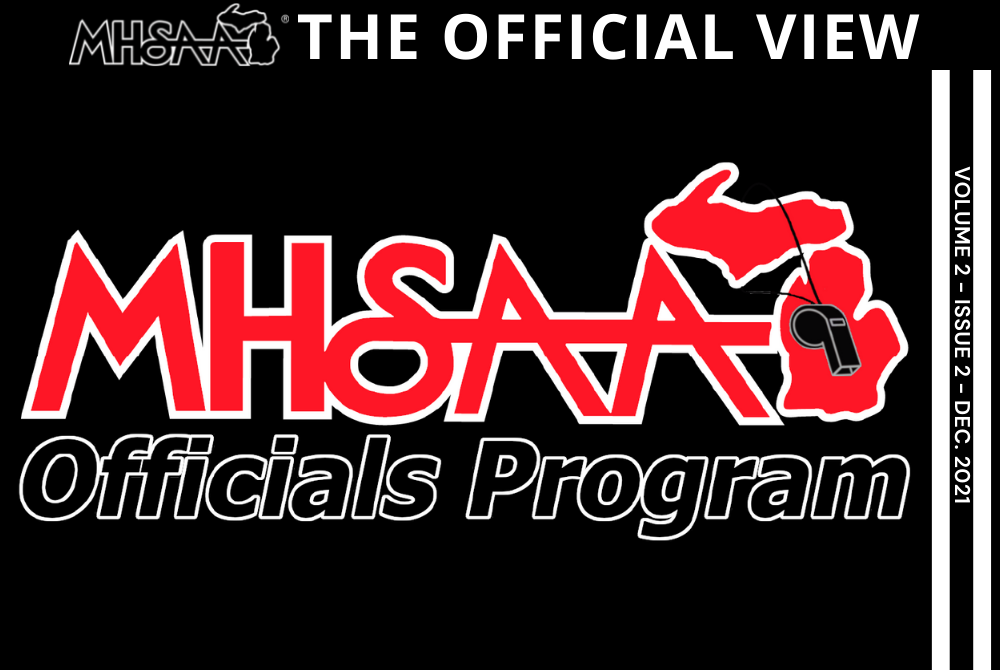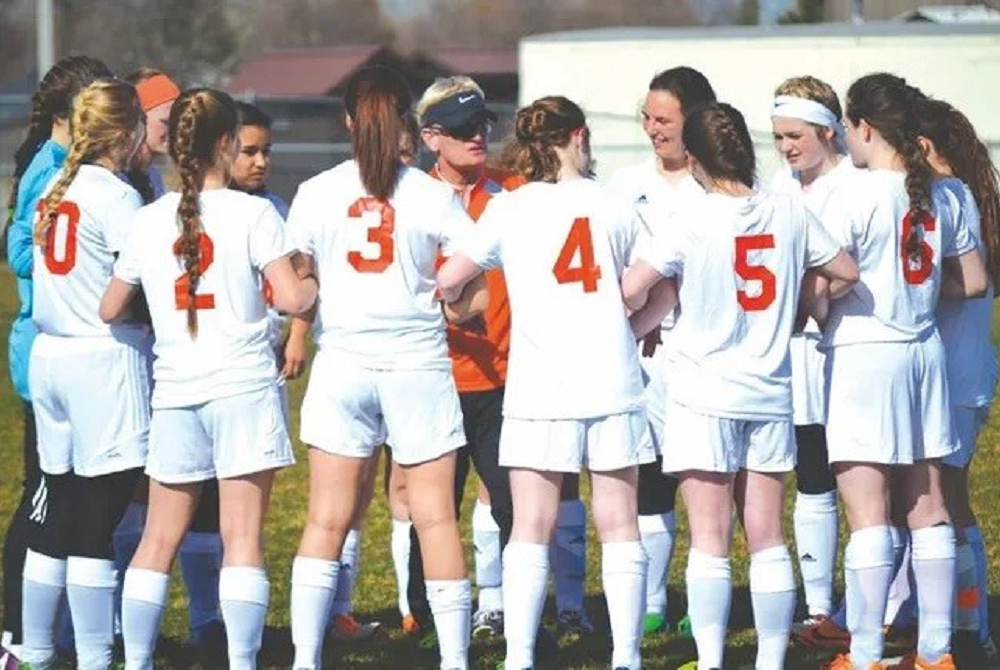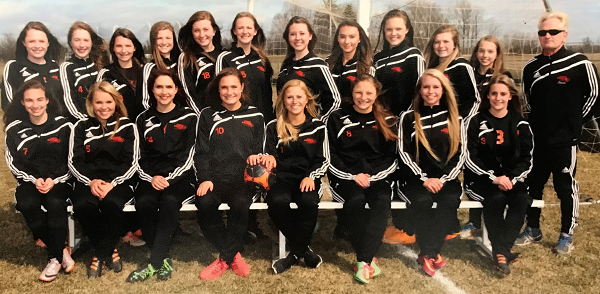
The Official View: The Crossroad We Face
By
Brent Rice
MHSAA Assistant Director
December 20, 2021
It’s time to call it what it is … a major crossroad and tipping point.
For more than a decade, the numbers of registered MHSAA officials have steadily declined from a high of about 13,000 to, today, around 7,700. While the COVID pandemic has certainly exacerbated those figures over the last two seasons, two of the top reasons officials give for leaving the avocation remains adult spectators and coach behavior.
School sports and traditional recreational programs have been supplemented, and in some cases, supplanted, by travel and club programs that, more often than not, do not share the same values and standards expected in education-based athletics. Many of these non-school programs require parents to spend exorbitant amounts in registrations fees, travel, lodging and meals with the implicit suggestion that this is the gateway to Division I college and professional sports. The result is that the criticisms hurled at the officials are more than an overzealous parent wanting a fair-called game – it is stakeholders defending their investments.
While we are often disturbed by some of the events documented during these club and travel contests, the real concern is that this permitted conduct has begun to seep into the school sports world. The result is that officials are simply walking away, leaving increasingly more games being moved or cancelled due to the lack of officials. The games that are being played are often staffed with smaller crews – perhaps two officials instead of three. Officials are in place to provide athletes with safe and fair opportunities to play sports, and shorthanded crews may reduce the ability for officials to see and call plays and fouls. These potential missed calls incite more disparaging comments from spectators, thus pushing more officials away from sports. This cycle cannot be sustainable much longer.
So, what are the solutions, and who do they come from?
The first is spectators. We refer to this as the difference between the whistle and the airhorn. When spectators just feel compelled to be vocally critical, they should make certain that their criticisms are infrequent, brief and not personal. Spectators should be the whistle and not the airhorn. Other spectators have a responsibility to set a good example and call out those who are going overboard.
School administrators also play a critical role in ensuring that officials are able to do their job in a safe and secure setting. Administrators should look for escalating situations in the stands and diffuse them before they become abusive. No one wants to remove parents and other spectators from events; but frankly, more of that needs to be done to show that inappropriate conduct and behavior will not be tolerated.
Finally, MHSAA officials need to be the first line of defense against unsportsmanlike behavior. This should be penalized when observed from coaches or players, without concern to the consequences that student or coach will later face. In short, bad behavior cannot be tolerated. Conduct found in the MHSAA Personal Attack Policy should result in an immediate ejection/disqualification, and similar conduct that occurs after the game should be handled as provided in the Post-Contest Ejection Policy. Unaddressed bad behavior by coaches and players encourages the same from spectators.
MHSAA game officials should focus their attention to the competition on the playing surface. This means that most comments from the stands should be ignored, and an official should never engage with critical spectators. This is not to say that officials must take abuse from spectators. If the language or behavior becomes a distraction to the contest, or personal and vulgar language is directed at the officials, the officials have the authority to have spectators removed from the facility (and should do so). No need for a big spectacle, ejection mechanic or yelling into the stands to engage fans. They should simply stop the contest and have the administrator on site remove the unruly spectator from the game.
There are a number of other factors contributing to the decline of officials that also need to be addressed. Low game fees, substandard locker room accommodations, unmanageable game times, and assigner and association politics all play a part. Those all pale in comparison to the main reason cited: Misbehavior by adults. MHSAA officials will inevitably continue to miss calls. That’s the nature of what they do. However, without them the games cannot be played, which means opportunities for Michigan students will also decline. We all have a responsibility to see that school sports remain closely tied to the values of educational athletics and maintain scope and perspective. We all must do better; otherwise, the crossroads of the officials shortage will only get worse.
It’s Official!
Postseason Assignments: Winter sport officials need to pay close attention to the changes for postseason consideration in effect this school year. Officials in most sports must opt into tournament consideration. This means officials this season for basketball, competitive cheer, gymnastics, ice hockey and wrestling must submit their availability on the MHSAA website – otherwise, the default is that they are unavailable. This is in addition to other postseason requirements such as completion of the rules meeting, the tournament exam and submission of the official’s regular-season schedule through the MHSAA website. These requirements are due by Dec. 15 for wrestling, Jan. 5 for basketball, Jan. 12 for competitive cheer and ice hockey, Jan. 19 for gymnastics and Jan. 26 for boys swimming & diving.
Seeking Committee Members: We are reconvening an ad hoc committee of educators/officials to assist with the development of curriculum that can be utilized by school districts for officiating classes in conjunction with the MHSAA Legacy Officials Program.
If you’re interested in serving on this committee (some in-person, but mostly virtual) and have a background as an educator, please reach out to [email protected].
Know Your Rules
BASKETBALL As Team A is preparing to make a throw-in from the end line, Team A players #15, #20 and #3 stand shoulder-to-shoulder next to each other immediately in front of the thrower. Team B player #11 requests to stand between two of the A players before the throw-in.
RULING Within three feet on the court from the throw-in, Team B players will be permitted to stand between the Team A players, if requested. If the Team A players were positioned more than three feet from the throw-in, this request would be denied.
It’s Your Call
REVIEW The play from the last It’s Your Call (found here) involved ball-handling by a back row volleyball player. Following a good dig by her teammate, the back row player appears to make contact with her left hand then right hand with her overhead pass. Since this is not the first contact on her side, the contact with the ball must be simultaneous with both hands. This is a multiple contact and a loss of point against white.
WRESTLING For the first time, the MHSAA will introduce a Girls Division into this year’s Individual Wrestling Finals. The following “It’s Your Call” takes place in a girls match but is applicable to the sport as a whole. Review the brief clip and let us know your thoughts. What’s the call?

Longtime Cheboygan Coach Stormzand Continues Giving to Game as Official
By
Tom Spencer
Special for MHSAA.com
April 10, 2023
Twenty-five years ago, Cheboygan girls soccer started by storm.
 Actually, “Stormy” is more accurate.
Actually, “Stormy” is more accurate.
As another girls soccer season gets rolling across Northern Michigan this month, the pitch will frequently experience a storm, er Stormy, again.
Stormy is Mark Stormzand, and he may be joined often by his regular referee partner, Alan Granger. Stormzand, one of many members in his family nicknamed Stormy, got the Chiefs girls soccer program started in 1997 after one year as a club. At the time, he was also an assistant coach on the school’s boys team.
His career included 217 total victories, seven District titles, six conference titles, and eight players who went on to play college soccer. He spent two seasons assisting the boys.
But he started another career in 1999. He became a soccer referee. He is still doing it today, which is why the Chiefs definitely will see him on their home field or somewhere else nearby this season.
Like many officials, Stormzand started using the whistle because he really just wanted to be a part of the game.
“I started with just boys soccer because I was coaching the girls,” Stormzand recalled. “I just wanted to be part of the game when I wasn’t coaching.
 “I love being around young athletes,” he continued. “And, I enjoy helping.”
“I love being around young athletes,” he continued. “And, I enjoy helping.”
Now at 69 years young, Stormzand plans to stay with officiating as long as most officials try.
“Like all of us, until my body won’t,” he says of his when he’ll leave the pitch. “Every year I keep thinking I am surprised I am still doing this.”
Stormzand is glad he started officiating. It has helped fill a void after coaching. It also helped fill a void in his personal life.
In 2015, his wife Gail died after battling breast cancer.
“We had been together since we were 15 years old,” said Stormy. “She was inspirational for my coaching … my kids loved her, and she was always a part of our team.”
Stormzand noted he’s had many great players and great teams over the years — all of which he credits with teaching him more than he taught — but the team from the spring of 2015 is at the top of the list. His wife’s passing came two months before the start of practice.
That team filled the greatest void in his life.
“I kept telling myself if I could make it to soccer season, I can make it,” Stormzand recalled. “They were my life ring by a long shot.
“The team that year was unbelievable with their sensitivity and concern and respect,” he continued. “I was just awestruck of how mature this group of 20 girls were dealing with me and my situation. … I will never forget them.”
Stormzand went on to coach the girls team three more springs as he officiated boys in the fall. He remarried in September of 2018, right after giving up the helm of the program he started.
“It was a dark day for Cheboygan girls soccer when Mark resigned,” said Jason Friday, Cheboygan’s athletic director. “He was one-of-a-kind.
“He just had a way of making every player, no matter what role they had, feel special,” Friday went on. “Year after year, the team chemistry and camaraderie was second to none.”
Stormzand also retired from 45 years in the forestry business. He’s seen a lot of changes in high school soccer, and he admits he picked up things officiating that made him a better coach.
 “When I ref’d, I’d see stuff other coaches did and I’d incorporate that into my thinking and coaching,” he said. “Ref’ing made me a better coach, and coaching me a better ref.”
“When I ref’d, I’d see stuff other coaches did and I’d incorporate that into my thinking and coaching,” he said. “Ref’ing made me a better coach, and coaching me a better ref.”
Among his favorite places to referee now are Cheboygan and Mackinac Island. He and Granger have taken the ferry to Mackinac Island for Friday evening and Saturday morning contests for about 10 years.
They’ve enjoyed the opportunity to get to know the Islanders on the pitch as well as the visiting team’s players. Many teams have middle schoolers on the roster, allowing the teams, coaches and referees to become more familiar with each other than they would during just the high school years.
Stormzand and Granger love the spirit of the game on the Island, especially when rivals are in town. Most all the games feature co-ed squads.
“It’s all the positive parts of sports,” Stormy said. “It is just fun — pure sport.
“You can learn the kids’ names, and you’re with them for six years and all their brothers and sisters,” he said. “It’s a very fun community place to ref, especially on a Friday night when they’re playing rivals like Beaver Island.”
Stormy admits he has enjoyed coaching more than officiating so far. But he doesn’t miss sitting on the sidelines in less-than-desirable spring weather. He recalls one season of wearing a raincoat for every match until the District Final.
Running on the pitch helps deal with the difficult weather. He’s seen many officials, players and coaches struggle with the weather conditions, especially when the Chiefs occasionally played at the Coast Guard Cutter Station field.
“We would play there periodically because the high school field had too much snow on it,” he said. “The Straits (of Mackinac) would still be frozen, and you’d have this mist coming off the Straits.
‘Some teams would show up without warmups, and it would be like 32 degrees and cold fog.”
 Tom Spencer is a longtime MHSAA-registered basketball and soccer official, and former softball and baseball official, and he also has coached in the northern Lower Peninsula area. He previously has written for the Saginaw News, Bay County Sports Page and Midland Daily News. He can be reached at [email protected] with story ideas for Manistee, Wexford, Missaukee, Roscommon, Ogemaw, Iosco, Alcona, Oscoda, Crawford, Kalkaska, Grand Traverse, Benzie, Leelanau, Antrim, Otsego, Montmorency, Alpena, Presque Isle, Cheboygan, Charlevoix and Emmet counties.
Tom Spencer is a longtime MHSAA-registered basketball and soccer official, and former softball and baseball official, and he also has coached in the northern Lower Peninsula area. He previously has written for the Saginaw News, Bay County Sports Page and Midland Daily News. He can be reached at [email protected] with story ideas for Manistee, Wexford, Missaukee, Roscommon, Ogemaw, Iosco, Alcona, Oscoda, Crawford, Kalkaska, Grand Traverse, Benzie, Leelanau, Antrim, Otsego, Montmorency, Alpena, Presque Isle, Cheboygan, Charlevoix and Emmet counties.
PHOTOS (Top) Mark Stormzand talks things over with his 2017 team during his time leading the Cheboygan girls soccer program. (Middle) Stormzand, now with more than two decades as an official. (Below) The 2015 team always will hold a place close to Stormzand’s heart. (Top photo courtesy of the Cheboygan Daily Tribune; middle and below photos submitted by Mark Stormzand.)

